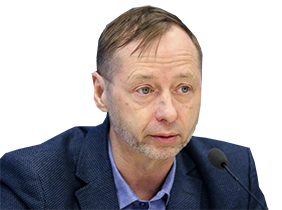Peace in Donbas is the only election promise of Volodymyr Zelensky that has a chance to be fulfilled. Although achieving it isn't as easy as it initially seemed when the president believed looking in Vladimir Putin's eyes was the right solution.
The Donbas conflict has entered a critical stage: there will either be a stable diplomatic settlement (freezing the conflict would also be seen as settlement), or things will start shifting towards military escalation. Actually, it's the will to avoid such escalation that is driving Zelensky's recent hyperactive efforts.
In fact, Paris hosted a virtual version of Normandy format talks, divided into stages: first, Emmanuel Macron and Angela Merkel spoke with Vladimir Putin, including on Ukraine. And then the two talked with Volodymyr Zelensky. After that, I presume, they briefed the Kremlin on the outcome of their conversation with the Ukrainian leader.
The Donbas conflict has entered a critical stage: there will either be a stable diplomatic settlement or things will start shiftring towards military escalation
This division is a consequence of Putin's demonstrative unwillingness to speak with Zelensky directly in the follow-up to the long-overdue decisions by the security council targeting Putin's main political ally in Ukraine, Viktor Medvedchuk. Really, how dare a sovereign state take legitimate steps within its competence, Putin is probably thinking...
There is no doubt about the purpose of the latest round of talks: it's the search for an option that would persuade Putin to actually implement the existing agreements. But no details of the talks have been revealed.
The reason is that there was no breakthrough in Paris, and there could've not been any: the talks in Paris were far from the main process that is now ongoing. The main track is now between Joe Biden and Vladimir Putin. The only thing that resurfaced following the Paris talks was the "clusters of the Minsk process". I should clarify here.
Ukraine insists on the package deal, that is, the simultaneous implementation of all "Minsk" provisions: a special status for Donbas in the Constitution, pardon for Russian proxies, local elections tied to the withdrawal of all troops, and regaining control of the border. Russia, on the other hand, has been imposing a sequential implementation, where Ukraine must first take all those extremely difficult moves they've been demanding from Kyiv and only after that will Russia consider the option of pulling out of Donbas. And it remains unclear when they will actually go for it – in months, years, or decades. It's also unclear whether they will withdraw at all – after all, Russian troops are still stationed in Transnistria, aren't they?
On this point, no compromise turned out to be attainable, thank God. Therefore, hardened Europeans came up with the idea of unbundling the Minsk Agreements into certain "clusters", within which actions take place simultaneously, but the clusters follow one another. Such an elaborate design, its authors believe, will allow getting over the main stumbling block: what comes first – disarmament of Russian proxies and withdrawal of the Russian military before holding local elections in Donbas, or pursuing with these elections to be held at gunpoint, just like that notorious "referendum" in Crimea – and with a similar outcome.
There was no breakthrough in Paris, and there could've not been any: the talks in Paris were far from the main process that is now ongoing. The main track is now between Joe Biden and Vladimir Putin. The only thing that resurfaced following the Paris talks was the "clusters of the Minsk process
It should be emphasized that on the said issue European leaders are closer to Ukraine's position than that of Russia. And the OSCE Mission, which mediates the process, is also closer to Kyiv's stance.
Russia, however, vehemently opposes it. Moreover, it offers that Ukraine coordinate (!) all key issues, including the "special status" in the Constitution and the abolition of a number of Ukrainian laws, including, the "language act", with the self-proclaimed authorities of the unrecognized republics. Yes, the ones who are even horrified to excuse themselves to the bathroom without Moscow's permission.
In Paris, Zelensky tried to accelerate things, emphasizing the fact that the Russian hordes are already near Ukraine's border, threatening the country with a bloody massacre, which will inevitably affect Europe as well. Therefore, Ukraine's president underlined, allowing Ukraine's integration into the EU and NATO is a highly urgent matter and the only real option to contain Russian aggression. Macron and Merkel listened with understanding and then took a break, claiming they need to continue consultations, but in reality, all they want is to see some clarity on the Biden-Putin dialogue.
How should President Zelensky's visit be assessed?
This was precisely a working meeting where Ukraine's position since 2014 was declared most clearly and fully: either the aggressor is held back with all seriousness, or the pristine Europe will be forced to observe the bloody horrors of war not on television, somewhere in a distant Syria, but live, not far from their own homes.
How should President Zelensky's visit be assessed? This was precisely a working meeting where Ukraine's position since 2014 was declared most clearly and fully
Zelensky, with his appeals almost resembling a mayday call, indeed was heard. European leaders went on to try to invent yet another compromise that would suit Russia and not completely destroy Ukraine.
The United States held back their warships, but pursued with Russia sanctions, and their stance is stronger than that of the European Union.
Meanwhile, Russia is sticking to an aggressive line: Ukraine's Consul Oleksandr Sosonyuk has been expelled from Moscow, while more than 50 strike aircraft and 15 warships, including landing vessels, were additionally transferred to Crimea.
Let's hope that the Ukrainian government will finally mature to realize that the real defense capability is within Ukraine, in the unity of population and effective economy.
Oleksandr Kochetkov is a Ukrainian political analyst


